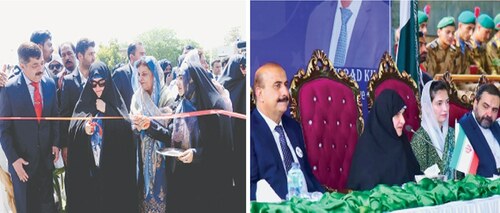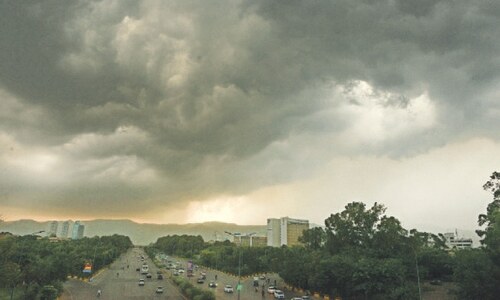Dr Olena Bordilovska is an associate professor at the Taras Shevchenko National University of Kyiv, in the capital of Ukraine, who focuses on South Asia. She visited Pakistan for the first time for her research, as well as to inform Pakistanis about her home country, its history and the current challenges facing Ukraine. Dawn caught up with her while she was in Islamabad to talk about her work and about South Asian politics.
Q: How did you come to focus on South Asia?
A: My background is the historical faculty, in the biggest national university in Ukraine in Kiev, the capital city. I was in university when I started to learn Indian culture. [After an interruption] I came back to issues related to South Asia, and then finally I got a doctor of science degree in politics in South Asia - primarily it was about the foreign policy strategy of India after the collapse of the Soviet Union and after the Cold War.
But Indian foreign policy is always, first of all about South Asia - their Pakistan relations, the Kashmir issue. For me it was very important to study all these things from both points of view – Indian and Pakistani – and it was much easier to get information from the Indian side. We still have some published information since the Soviet Union even, about India’s relationship in the world, but not so many from the Pakistani side.
I spent four years in Europe with my husband, who is a member of staff at the Ministry of Foreign Affairs, and I can get more information from very famous Pakistani authors and your magazines to understand what is happening from the other point of view as well.
That’s why, for me, this visit is very important. For a scholar who is still in the South Asian studies, to get more knowledge from inside.
I have two objectives. The first is a scientific interest for my further researches, for my teaching. But the second target is that I would like to bring some ideas about Ukraine; not so many people here, in Pakistan, know what my country is, what problems we face right now, what our relationships are, what our intention in foreign policy is.
Q: How has the India-Pakistan relationship changed since you began studying it?
A: I can see some waves in the relationship. It depends on the political situation in both countries. But we can see attempts from both sides, for instance Narendra Modi’s visit to Nawaz Sharif’s family and we [see the same with Nawaz Sharif]. There is at least a will, a wish to do something.
There are some business relationships and tourism and you have cultural ties and you need peaceful development for the future because it is not possible to keep the Kashmir situation for many years.
Someone from the former Indian Ministry of External Affairs [had] suggested the Kashmir issue be set aside for bilateral cooperation. My Indian colleagues want to put the issue aside and work on business, inviting Pakistani actors to Bollywood films, and then maybe come back to Kashmir.
Pakistan tries to invite observers from international organisations and other countries in negotiations which is not accepted by India.
Q: What do you think the new US presidential administration has in store for South Asia?
A: They should be present here. I hope Mr Trump has a team with good advisors who will tell him South Asia is a priority. Barack Obama and his secretary of state Hilary Clinton launched this ‘pivot’ to Asia, which was a very important strategic direction in American foreign policy.
Trump never said he will continue Obama’s initiatives but I still think he cannot avoid this region because it is very important. We know a lot of Indians and Pakistanis are doing business in the US, there are huge diasporas living there, who pay taxes and they cannot just avoid such a large number of people and business and technology connections.
I think the US will be present in the region. South Asia is important for the US in their balance or counterbalance with China. There is a history of very fast development in Asia and one of the current global trends is pivot to Asia. This is the so-called Asian century. Asia presents itself in global area, year by year, with very good results and interesting propositions. Look at economic development, the IT sphere, the middle class growing, which is also what you have in Pakistan.
No one can avoid these questions and the same applies to the US. If they want to maintain their leadership, and Trump has openly said that the priority is American national interest, they will do business in South Asia. And they need allies in this region, in Asia Pacific let’s say, to counterpart China.
Published in Dawn, June 1st, 2017















































Dear visitor, the comments section is undergoing an overhaul and will return soon.